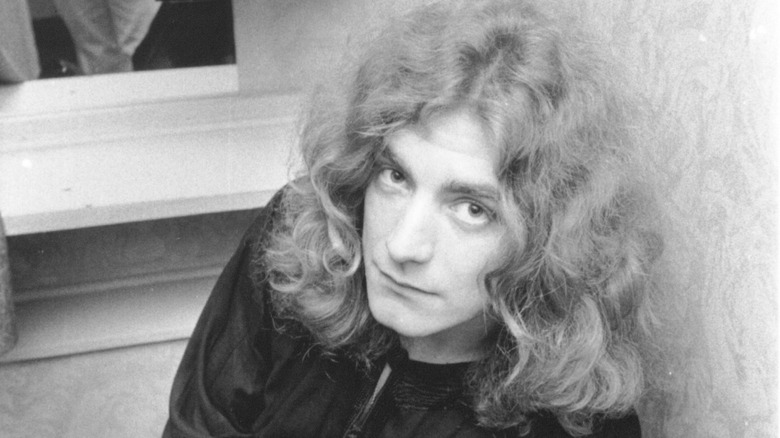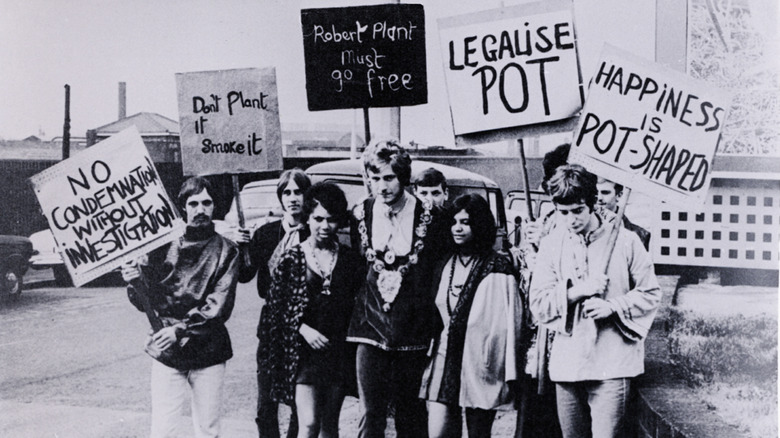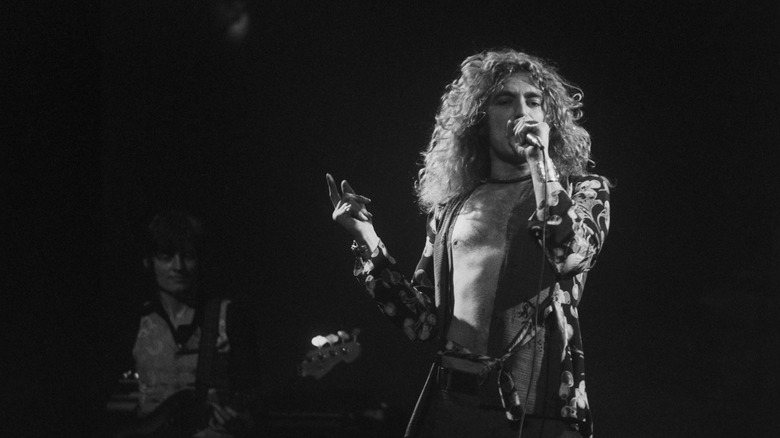The Bizarre Truth About Robert Plant's Drug Bust
Back in the 1970s, the hard-partying reputations of Robert Plant and his bandmates in Led Zeppelin was the stuff of legend. The band had some of the most infamous parties in rock history that included a naked Jimmy Page, the band's guitarist, covered in whipped cream. Then there was the one on Halloween 1974, which a BBC DJ described as akin to "a medieval orgy" that included naked jelly wrestling (via The Guardian). Drugs were a big part of the Led Zeppelin scene, so perhaps it's not surprising that in 1967, a young Plant — who had yet to join the band that would catapult him to fame — became embroiled in a criminal court proceeding that was billed as a drug arrest.
In actuality, it was little more than a ticket over a fender bender. It was all a part of a media campaign cooked up by his manager Mike Dolan to bring attention to the young singer and his group, Band of Joy, from England's West Midlands. The musical act included drummer John Bonham who would also later become a member of Led Zeppelin. The ploy worked, sort of. The local press showed up for the court date on August 10 in the town of Wednesbury, but the stunt fell flat when the hippies Plant and Dolan hoped would come for the pro-marijuana rally they'd envisaged didn't turn up. Still, Plant got his name and face in a few newspapers.
A teenage Robert Plant was trying to break into the big time
Robert Plant, born on August 20, 1948, in West Bromwich, England, quit school and left home at 16 to pursue music. He lived with friends and worked a construction job while trying to make a name for himself as a singer. He tried a number of strategies to garner attention, including going by the name Rob3ert Lee — "the figure three is silent," he told a journalist from the Birmingham Evening Mail in May 1967 — while fronting a band called Listen.
By the summer of 1967, when he was 18, he had already released a single, "Our Song," as a solo artist and was then trying to make something happen with Band of Joy. It was during that time while driving around in his Ford van in West Bromwich that he was involved in an accident. He'd pulled off a side street onto a roadway where he clipped a car and crashed into a tree. It wasn't a horrific car crash, but police charged Plant with "driving a van without due care and attention," for which he pleaded not guilty. Mike Dolan saw this as a great opportunity for some free press for Plant and the band.
From PR stunt to rockstar
On Robert Plant's court date, he appeared in Wednesbury in full hippy regalia, wearing what the Liverpool Daily Post described as an "Oriental costume and an Indian bridegroom chestpiece." Unfortunately, the large crowd Plant and Dolan hoped would show up as part of the stunt didn't materialize. Instead, seven of the singer's friends and bandmates, calling themselves "flower children" also dressed in hippy regalia, held signs that had various slogans like "Don't Plant it, Smoke it," "Happiness is Pot Shaped," and "Robert Plant Must Go Free." In court, the judge dismissed the case for lack of evidence. Papers from Liverpool, Birmingham, Hull, and even London included short blurbs about the event.
Unfortunately, for the rest of Band of Joy, every newspaper simply referred to Plant as "a pop singer" without mentioning the band. Another unfortunate consequence of the event was the firing of a nurse in training, Dorette Thompson, for attending the rally.
At least things worked out for Plant and Bonham. After Band of Joy broke up in the spring of 1968 it was only a few months before the pair would join forces with Jimmy Page and bassist John Paul Jones in the band that would become Led Zeppelin, releasing their debut album in January 1969 with artwork that featured the iconic Hindenburg zeppelin on the cover. In the course of two years, Plant had gone from pulling a PR stunt for attention to fronting a band that would change rock n' roll forever.


